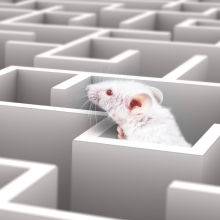Memory: Biological research
 The following worksheet checks your understanding of the role of various biological factors on one behaviour - in this case, memory. Try to answer the questions first before checking the answers that are provided in the "hidden boxes."
The following worksheet checks your understanding of the role of various biological factors on one behaviour - in this case, memory. Try to answer the questions first before checking the answers that are provided in the "hidden boxes."
Checking your understanding
1. What is meant by neurogenesis and dendritic branching?
Neurogenesis is the "birth of new neurons." Neurogenesis takes place in pre-natal development, but it also appears to take place in adults in the hippocampus.
Dendritic branching is the growth of more "branches" on the dendrites of neurons in the brain, which help to send electrochemical messages down the axon.
2. How does the biological theory of dendritic branching support the model of Atkinson and Shiffrin?
Dendritic branching is the result of the repeated firing of neurons. Atkinson and Shiffrin argued that rehearsal led to the creation of memories, but they did not explain why. Biological research seems to explain that that long-term potentiation is necessary for the creation of memories.
3. What did Draganski observe happened when people discontinued juggling, a newly acquired skill?
Dragansky found that there was a decrease in the grey matter - that is, dendritic branching - in the mid-temporal lobe. This decrease in grey matter is called synaptic pruning.
4. Why is the understanding of neural plasticity important in our understanding of localization of behaviour in the brain?
By measuring the increase in grey matter in a specific part of the brain as the result of learning a new task, for example, we then can assume that this part of the brain was firing more frequently, leading to dendritic branching.
5. What conclusions did Meaney and others make about the role of maternal care or deprivation with regard to brain plasticity?
Meaney found that rats who were deprived of maternal care as pups suffered from spatial memory impairment as adult rats - with higher levels of hippocampal cell loss. This lack of stimulation in the environment has a negative effect on the brain's development.
6. What conclusions did Maguire make about the role of the environment on the brain?
Both the memorization of the routes and the subsequent daily driving around the city results in changes in the posterior hippocampus. She argues that this is evidence that the posterior hippocampus is responsible for the creation of spatial memory.
7. According to Newcomer, what role does cortisol play in memory?
Cortisol plays a complex role in memory. When cortisol levels are high, this impairs one's ability to create memories. However, it appears that a slight increase in cortisol actually helps to create memory. It appears that there is an optimal level of cortisol for learning but once that level is exceeded, then learning is more difficult.

 IB Docs (2) Team
IB Docs (2) Team
